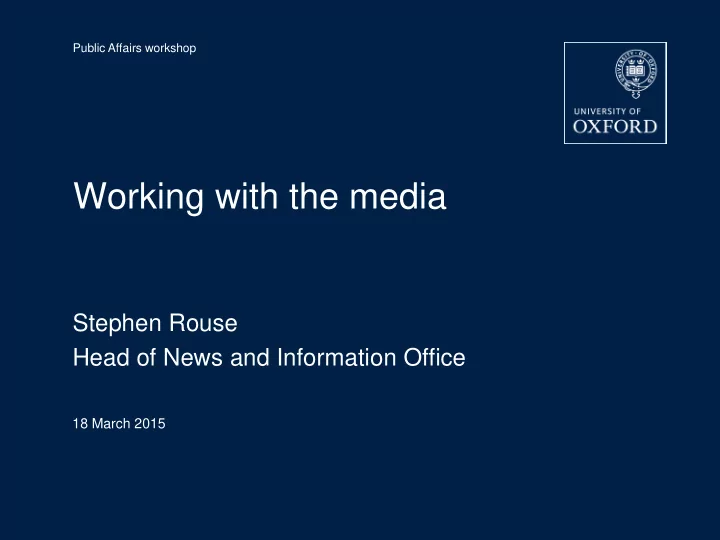

Public Affairs workshop Working with the media Stephen Rouse Head of News and Information Office 18 March 2015
What is news?
“News is what somebody somewhere wants to suppress. All the rest is advertising.” Lord Northcliffe
What at is is news? s? • It's immediate – something that has just happened • It's suspense – waiting for something to happen • It's conflict – differences of opinion • It's oddity – the unusual, bizarre, the unexpected • It affects ME • It's people
Ge Gettin ing g you our r st stor ory not oticed iced Do Do Make sure it is newsworthy Make the audience care Make the first ten words of a press release as effective as possible Avoid fancy language or jargon Make it as easy as possible for journalists to do their jobs
Ge Gettin ing g you our r st stor ory not oticed iced Do • Release in good time • Use real life case studies to illustrate the problem and build human interest • Pick an angle – topical stories
Ge Gettin ing g you our r press ess release lease not oticed iced • Do • Allow colleagues to check through the release. • Use images – resist the temptation to have line- up of men in grey suits • Pitch to journalists • Really understand your story • Call as early as possible
Ge Gettin ing g you our r press ess release lease print inted ed Don't Write a press release on a trivial subject Start with lead-up material. The reader must know what the story is straight away Use boring titles – you need a strong 'hook' to grab attention Phone the news editor to ask if he got the release. He will hunt you down and kill you!!!
Handling a crisis
How could you let this HAPPEN???
There is no spin
During a crisis • Do the right thing – then tell people you’ve done it • Your priorities are: 1. People 2. The Environment 3. Resources IN THAT ORDER!!!
During a crisis • Express: Concern – BUT saying sorry is not enough 1. Action – What you are doing about it 2. Reassurance – perspective, lessons 3. learned
During a crisis • Assess your risk: - How responsible are we? - How can this get worse, and how fast? - Who will criticise us? - How will it affect confidence in us? - What other areas could it spill into?
During a crisis Do • Have a holding statement until all the facts are in • Take control – first to speak to the media set the story • Be accurate – you will be challenged if not • Assume all the facts are out there
During a crisis Do • Broaden out the issue if it is sector-wide • Mobilise allies to speak on your behalf • Communicate internally • Have senior staff briefed and available for interview
During a crisis Don’t… • …Just issue a release • …Lie, mislead, or blame • …Get aggressive • …No comment • …Play the victim • …Just hope it will all go away
After the crisis • Think ahead – what will be the story one day on, one month on, one year on • Have a recovery plan and tell people about it • Media monitoring – how much was positive/negative
Numbers working for you Activity Figure Unique visitors to the University website each year 8.9 million Number of media enquiries each year 6,000 Number of public enquiries each year 2,000 Number of press releases issued each year 178 Number of attendees at University events per year 8,300 Circulation of Oxford Today (print issue) 165,000 Facebook likes to date 2.1 million Twitter followers to date 188,000 Number of images in the online image library 7,200 YouTube views to date 3.8 million
News – how we can help you • Media relations manager for each academic division • Advice on publicising your news stories • Daily News Alert • Media training • ISDN line for radio interviews
http://www.ox.ac.uk/public-affairs/media- coverage/media-guidance news.office@admin.ox.ac.uk (01865) (2)80528
Recommend
More recommend